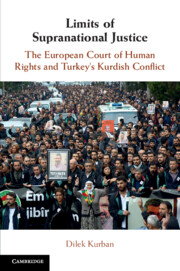Book contents
- Reviews
- Limits of Supranational Justice
- Limits of Supranational Justice
- Copyright page
- Dedication
- Contents
- Acknowledgements
- Interviews
- Abbreviations
- 1 Introduction
- Part I Historical Background
- Part II Kurdish Lawyers, the Turkish State and the ECtHR
- 5 Bottom-up
- 6 Top-down:
- 7 Conclusion
- References
- Table of Cases
- Subject Index
5 - Bottom-up
Kurdish Legal Mobilization at the ECtHR
from Part II - Kurdish Lawyers, the Turkish State and the ECtHR
Published online by Cambridge University Press: 30 October 2020
- Reviews
- Limits of Supranational Justice
- Limits of Supranational Justice
- Copyright page
- Dedication
- Contents
- Acknowledgements
- Interviews
- Abbreviations
- 1 Introduction
- Part I Historical Background
- Part II Kurdish Lawyers, the Turkish State and the ECtHR
- 5 Bottom-up
- 6 Top-down:
- 7 Conclusion
- References
- Table of Cases
- Subject Index
Summary
Until the ECtHR entered the picture, Turkey’s legal landscape lacked the basic ingredients for access to justice. Justiciable rights were subject to significant restrictions, the judiciary was unreceptive to rights claims, and civil society was weak and disorganised. Without funding, rights-advocacy organisations or pro bono legal assistance, human rights victims lacked access to a support structure. Once Turkey recognised the ECtHR’s oversight, Kurdish lawyers mobilised owing to their historically embedded rights consciousness, relatively high level of organisation and resistance experience, and the sheer scale and density of state violence. They became the top litigant group in Strasbourg in terms of the number of petitions they filed and the precedent-setting judgements they won. Based on in-depth interviews, this chapter accounts how Kurdish lawyers have mobilised the ECtHR to resist state violence in an emergency context. It shows the complex ways in which Turkey’s recognition of the right of individual petition and efforts to accede to the EU, and the ECtHR’s post-enlargement reforms have affected and been affected by Kurdish legal mobilisation since the early 1990s.
Keywords
Information
- Type
- Chapter
- Information
- Limits of Supranational JusticeThe European Court of Human Rights and Turkey's Kurdish Conflict, pp. 185 - 229Publisher: Cambridge University PressPrint publication year: 2020
